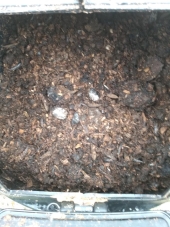


Chad Sentman wrote:
This seems like something a sales rep would say.
Diane Kistner wrote:Now I'm totally confused about what I need to get in the way of a composter. I have little dogs who love nothing more than rolling around in chicken litter and stinky kitchen scraps. Even when I dump it into the middle of big brush piles, they manage to climb down in between the branches and perfume themselves. Then they are determined to sleep with me!
What I want is something to dump kitchen scraps and chicken litter (mostly pine shavings, sometimes leaves) into and just leave it, no turning, not expecting any compost to come back out anytime soon but having a place to put it where it can rot down and the dogs can't get into it. I was looking at those black free-standing bins with the open bottom, but then I read some reviews that said the squirrels chewed into the plastic. Most of my leaves and branches I just pile on the ground, but I could use some to keep the green stuff from getting too stinky if the pine shavings wouldn't be enough.
What would y'all recommend? Would I be happy with a Soilsaver? How do the squirrels do with those? I've thought about doing a pallet compost bin, but that's larger than I have room for.


Bryant RedHawk wrote:
I would not know what anyone selling "Humic Acid" is actually marketing.

Bryant RedHawk wrote:
Humic Acid life is fleeting, which is why you can't go to any nursery store and buy some.
Ellendra Nauriel wrote:I use a "Natalie", by the brand "Baby Lock". Its sturdy enough to handle heavy materials, and is all mechanical. No computer chips! It also has all-metal insides, which makes it very durable, although it also makes it rather heavy.

Bryant RedHawk wrote:
There is a file here I wrote many years ago titled "everything you want to know about spent coffee grounds", there is lots of info in that post.
